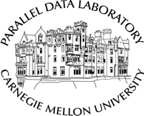
PDL Talk Series
AUgust 26, 2021
TIME: 12:00 noon - to approximately 1:00 pm EDT
PLACE: Virtual - a zoom link will be emailed closer to the seminar
 SPEAKER: Phil Gibbons, Professor, CMU
SPEAKER: Phil Gibbons, Professor, CMU
Processing-in-Memory: Theory and Practice
As computational resources become more efficient and data sizes grow, data movement is fast becoming the dominant cost in computing. Processing-in-Memory (PIM), an idea dating back to at least 1970, is now emerging as a key technique for reducing costly data movement, by enabling computation to be executed on compute resources embedded in memory modules. While there has been considerable recent work on the systems/architecture/technology side of PIM, there has been very little work addressing the theory/programming/algorithm side. Open problems include: How does/should programming/algorithm design on PIM systems differ from traditional shared/distributed settings? What are the fundamental limitations/trade-offs in using processing-in-memory?
This work-in-progress talk highlights our very early results on addressing these questions. As a driving application kernel, we focus on a novel PIM-friendly index structure supporting parallel inserts/deletes, point queries, and range queries. Our index addresses head-on the inherent tension between minimizing communication and achieving load balance in PIM systems. The talk will also report on our early experiences implementing our ideas on UPMEM’s 2,560-module PIM system.
BIO: Phillip Gibbons is a Professor in the Computer Science Department and the Electrical & Computer Engineering Department at Carnegie Mellon University. He received his Ph.D. in Computer Science from the University of California at Berkeley in 1989. Prior to joining CMU, Gibbons was a researcher at Bell Laboratories and Intel Research Pittsburgh, and co-director of the Intel Science and Technology Center for Cloud Computing. His research areas include big data, parallel computing, distributed systems, databases, and computer architecture. His 200+ publications span systems and theory, and have been cited 27,000+ times with an h-index of 82. He recently won the ACM Paris Kanellakis Theory and Practice Award for pioneering the foundations of streaming data analytics. He was founding Editor-in-Chief for the ACM Transactions on Parallel Computing, Associate Editor for the Journal of the ACM and other journals, and program or area chair for a number of conferences in parallel/distributed computing, sensor networks, and databases. Gibbons is both an ACM and IEEE Fellow.
 SPEAKER: Mohammad Bakhshalipour, Ph.D. Candidate, CMU
SPEAKER: Mohammad Bakhshalipour, Ph.D. Candidate, CMU
Algorithm/Hardware Co-design for Mobile Robot Path Planning
I will present RACOD, an algorithm/hardware co-design for real-time mobile robot path planning. RACOD consists of two main components: a hardware accelerator for speeding up the costly collision detection operations, and an algorithm-level speculation technique for aggressively parallelizing the robot path search algorithm. By affording multiple collision detection hardware accelerators and speculating up to a similar amount of parallelism, RACOD significantly improves the performance of path planning for mobile robots.
BIO: Mohammad Bakhshalipour received his M.Sc. and B.Sc. in Computer Engineering from Sharif University of Technology. Since 2019, he has been working toward a Ph.D. degree at Carnegie Mellon University. His research interests include prescriptive memory, hardware/software co-design, robotics in the wild, and data prefetching.
CONTACTS
, PDL Co-Director
RMCIC 2311
, PDL Co-Director
(412) 268-3064
GHC 9109
Executive Director, Parallel Data Lab
VOICE: (412) 268-5485
PDL Administrative Manager
VOICE: (412) 268-6716